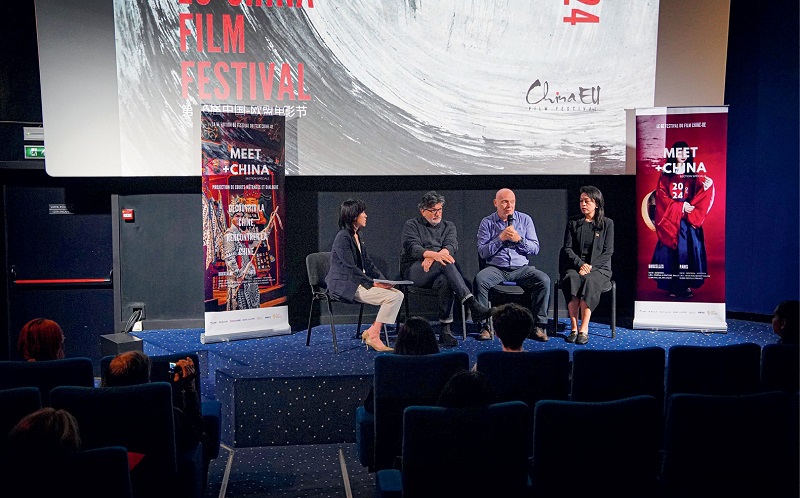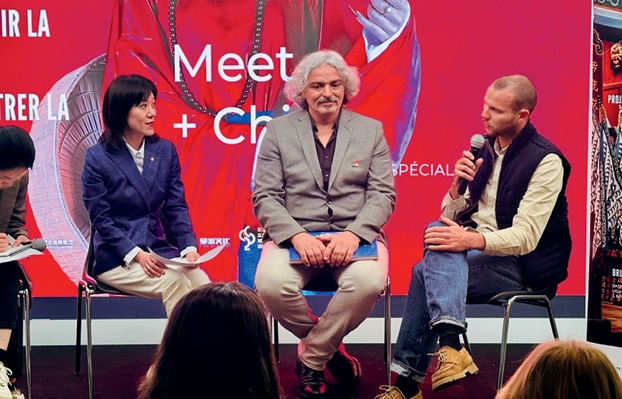Over the past decade, the EU-China Film Festival has grown into an important platform promoting cultural exchanges and international communication.

The special Meet China screening of the 6th EU-China Film Festival is held in Brussels on October 12, 2024.
For Yuan Mengqian, secretary general of the EU-China Film Festival (EUCNFF), one of her most enduring memories of her career is the senior Europeans who told her the festival was the first time they watched a Chinese movie. “They said that even if the language is different, the emotions in the films are common and touching. The sincere feedback made me feel that what we are doing is meaningful and can bring different cultures closer,” Yuan told China Today.
Since its inception in 2015, the EUCNFF has been held six times at the EU headquarters in Brussels, with over 50 Chinese films screened. It now has become an important platform for cultural dialogue between China and Europe.
Yuan compared the film festival to an international electric plug adapter, meaning that in the context of different cultures and cognitive systems, the film festival allows everyone to plug in and make a connection. “We hope this platform can allow more audiences to truly see each other,” Yuan said.

Guests and students pose for a group photo after the special screening event on October 12, 2024.
Platform for Cultural Exchanges
Based on the Chinese film market and the European audiences preferences, the EUCNFF Committee annually selects the best films that have been shown on the Chinese mainland during the past two years, covering a variety of genres and themes. It allows European audiences to appreciate the diversified features and artistic charm of Chinese films, and also pursue a deeper understanding of the profound Chinese culture and the development of contemporary China.
Due to cultural differences between Eastern and Western countries, the committee has adhered to one film selection criteria: the inspiration of empathy. Beyond languages, the films must carry the commonalities of human emotions, such as family bonds, personal growth, and respect for nature. These shared emotions can transcend cultural differences to create resonance among the audience.
Yuan said that in previous screenings, European audiences were particularly interested in themes such as natural relationships, individual growth, and family affection. “For example, after watching the Snow Leopard, a story of how Xizang’s herdsmen live in harmony with nature, many European audiences said that a life of living with the wild world and animals reminded them of their childhood in the countryside. [The film] even [introduced] new thoughts on environmental protection and ecological issues. This is why we insist on choosing films that are full of emotion and have the common characteristics of all humankind. Despite cultural differences, we can always understand each other with shared emotions,” Yuan said.
In the feedback the committee receives each year, Yuan said they have seen the European audiences’ acceptance of and expectations for Chinese films increase with each passing year. They started out being curious and trying to understand, and now look forward to watching more Chinese films. Yuan said that after the screening of Creation of the Gods I: Kingdom of Storms, the first part of China’s first mythological epic trilogy, many audiences discussed the background music and costume designs in the film, showing their understanding for the Eastern aesthetics. They also appreciated the improvement in technology, and paid attention to the cultural connotations.
“The European audience generally hopes to see more diverse themes, not just commercial films, but also stories on real Chinese society and daily life. They are very interested in traditional culture, such as films related to the Spring Festival, tea culture, handicrafts, and rural life. Some audiences even made suggestions to screen more mythological movies. Their enthusiasm for Chinese culture really surprised us,” Yuan said.

The production manager of Flair Production Hugo Tostain (first from right) and French documentary director Karim Houfaïd (center) share their views on Chinese films during the special Meet China screening in Paris on October 13, 2024. Photos courtesy of Yuan Mengqian
Innovations for Industrial Development
In order to further promote cultural and artistic exchanges between China and Europe, the EUCNFF Committee has organized many events about modern China. Last year, it held two special Meet China events in Brussels and Paris, screening various genres such as documentaries, animation, and short videos to present China in a more realistic way.
During the events, many co-produced films were screened, including China on Track, The Digital Adventure of China Travel, and Living in China. The stories of Chinese life and human-nature interaction from the perspective of foreigners received positive feedback from European audiences.
“Many viewers thought that this type of content was easier to approach, because it presented a tangible contemporary China without grand narratives. The stories such as a winter in a small town, a craftsman’s persistence, and a young group’s choices living in a city, showcase a multi-dimensional, warm, and lively China,” Yuan said.
In addition to diverse forms of communication, the EUCNFF has become a collaborative platform. Yuan said that some European production companies proposed cooperation with Chinese directors after watching their films. Some young Chinese directors connected with international distribution companies to help their works enter overseas markets. Some projects have also been launched to create joint productions and hold overseas exhibitions. The EUCNFF Committee also found some European universities to promote multilingual translation projects for young Chinese and European creators’ videos.
Another event for the youth organized by the committee, the EU-China Youth Film Festival, is also held annually. It invites youth and high school students in China, European countries, and around the world to submit original videos. Through selection, screening, and awards, it provides a stage for young creators to showcase their talent, encouraging them to record their life through video and pursue cross-border dialogue. Since its inception in 2015, it has been successfully held for 10 years, with over 6,000 short films submitted.
To inspire more creative projects, the committee has held dialogues between filmmakers and universities in recent years, inviting directors, producers, scholars, and students to discuss topics such as cross-cultural narratives and images in cities. “These events make the film festival not only a platform for watching movies, but also an incubator for cross-cultural cooperation,” Yuan said.
Turning her eyes toward the future development of the EUCNFF, Yuan said she hopes to bring more Chinese films to more European cities, in order to attract larger numbers of Europeans who are interested in Chinese culture to participate in watching and communicating. The committee can learn how they see China and what types of films they want to watch. At the same time, Yuan plans to bring more European films to China, so that more Chinese can understand the expression and artistic exploration of European films. Through such mutual interactions, the China-EU cultural exchanges can continue to develop.
“I am looking forward to more films telling [stories about] Chinese mythology and traditional culture in the future. They are not only treasures of China, but also cultural wealth shared by all humankind. The film festival will become an important platform for carrying these stories to the world. It is not a short-term [project], but a long-standing cultural bond that connects people, [fosters] understanding, and [looks to] the future,” Yuan said.